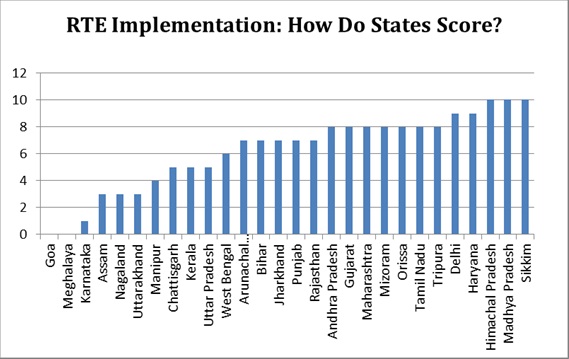
Progress of States in RTE implementation
20 April 2011
It has been a year since the beginning of the implementation of the Right to Education (RTE) Act. The Act lays down a number of things to be done at the level of the Central and the state governments. As per the Act, the state governments have to issue notifications with respect to setting up certain bodies, and specifying certain policies.
The Ministry of Human Resources & Development (MHRD), Government of India (GoI) has, very recently, come out with a report which analyses the extent to which the state governments have taken these steps. The report specifically looks at the following:
- Notification of the State Rules: The State governments are required by notification, to make rules for carrying out the provisions of the Act.
- Constitution of State Commission for Protection of Child Rights / REPA: As per the Act, the State Commission for Protection of Child Rights (SCPCR) has an important role to play. It is supposed to (a) examine and review the safeguards for rights provided by the Act and recommend measures for their effective implementation; (b) inquire into complaints relating to child’s right to free and compulsory education;
- Notification of Academic Authority: As per the Act, the State governments are supposed to set up an academic authority whose main function would curriculum and evaluation procedure.
- Policy on Eight Year Elementary Education
- Policy on No Detention
- Policy on No Corporal Punishment: The Act says that no child would be subjected physical punishment or mental harassment.
- Policy on No Board Examination up to Elementary Level: As per the Act, no child would be required to pass any board examination till completion of elementary education.
- Policy on Banning private Tuition:The Act lays down that no teacher would engage himself or herself in private tuition or private teaching activity.
- Policy on Banning Screening Procedure and Capitation Fees: The Act says that no school would collect any capitation fee and subject the child or his or her parents or guardian to any screening procedure.
- Policy on Minimum Working Days and Instructional Hours: The Act specifies the minimum number of working days / instructional hours, separately for the primary and the upper primary sections. For the primary section, the minimum number of working days are 200 and the minimum number of instructional hours are 800. For the upper primary section, the number are 220 days and 1000 hours.
I have created an index which assigns a value of 1 for each of the items. The maximum value of the index would be 10 and the lowest value would be zero. So how are the states doing? This is indicated in the following diagram:
The diagram indicates that out of 28 states, 10 (slightly more than one-third) states have value of index less than or equal to 5. Three states- Himachal Pradesh, Madhya Pradesh and Sikkim have full scores i.e. they have issued all the relevant notifications and out the policies in place. Surprisingly, states like Goa, Karnataka and Kerala, which have traditionally been better performers, have scores less than 5.

If we look item- wise, 23 states have put in place a policy on eight year elementary education and no corporal punishment, followed by setting up the academic authority, no detention policy and no board exams up to elementary level (21 states). Very few states have issued notification regarding the rules or set up the academic authority (only 11-12 states), as indicated in the following table:
| Item | No. of States |
| Notification of State Rules | 11 |
| Constitution of SCPCR/ REPA | 12 |
| Banning Private Tutions | 16 |
| Ban on Screening Procedure and Capitation Fees | 16 |
| Minimum Working Days and Instructional Hours | 18 |
| Notification of Academic Authority | 21 |
| No Detention | 21 |
| No Board Exams up to Elementary Level | 21 |
| Policy on 8 Year Elementary Education | 23 |
| No Corporal Punishment | 2 |
The report has not included the progress of states in setting up of a State Advisory Council, (mentioned in the Act) which is supposed to advise state governments on effective implementation of the provisions of the Act.




